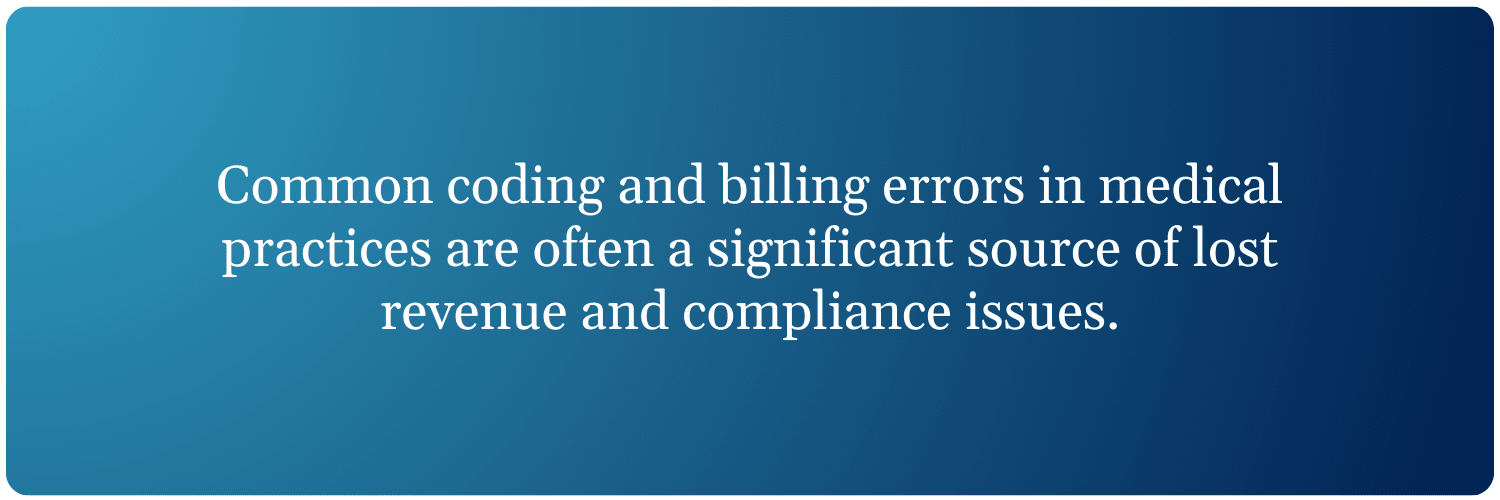The Top 10 Most Common Medical Billing Errors

This blog was originally published in July 2022 and was updated in February 2024
Patient billing is critical to the financial health of an independent physician practice. When billing errors are made, revenue can be lost and severe consequences can result. For example, errors in Medicare and Medicaid billing are not tolerated and can actually result in the practice not being allowed to bill those entities for several years if negligence is discovered in the billing process.
The financial ramifications of medical billing errors can be substantial. Keep reading to learn the most common medical billing errors, as well as ways to avoid making these errors.

10 common medical billing errors
Common coding and billing errors in medical practices are often a significant source of lost revenue and compliance issues. These errors can result from various factors, including incorrect data entry, lack of understanding of payer policies, and outdated billing practices. By highlighting common medical coding errors and how to prevent them, independent physicians can safeguard their practices against financial and legal pitfalls.
1. Incorrect modifiers
One of the most common medical billing errors is the misuse of modifiers. Using an incorrect modifier, or failing to use one when necessary, can lead to claim denials. Regular training for staff on the latest coding changes is part of effective strategies for addressing medical coding errors and how to prevent them.
2. Billing the wrong payer
Ensuring accurate payer information is key to preventing common medical billing errors. This includes confirming both primary and secondary insurance. A common mistake is assuming a patient’s coverage without verification, such as mistaking a Medicare Advantage plan for traditional Medicare, leading to incorrect billing.
3. Omitting Details on Claims
Simple mistakes like transposing numbers or misspelling names can lead to claim denials. A thorough review process before claim submission can significantly reduce medical billing errors.
4. Lack of prior authorizations
Failing to obtain prior authorizations when necessary is a prevalent issue. These authorizations are often required for certain procedures and medications to demonstrate medical necessity. Ensuring the alignment of diagnosis and procedure codes can help obtain these authorizations.
5. Unbundling
This occurs when billing separate CPT codes for procedures that should be billed as a single code. Understanding the bundling rules and regularly reviewing guidelines can prevent such errors.
6. Upcoding
Upcoding involves using a higher-level code than justified, often done to maximize reimbursement. This practice can lead to audits and legal issues.
7. Duplicate billing
Billing for the same procedure more than once can happen due to clerical errors. Implementing checks and balances in the billing process can mitigate this risk.
8. Failing to bill for services
Sometimes, services provided are not billed due to oversight or miscommunication. Regular audits of services rendered versus billed can help identify and rectify these discrepancies.
9. Not verifying patient insurance
Failing to verify insurance before treatment can result in denied claims. It's important to have a system in place for verifying insurance coverage at each visit.
10. Missing filing deadlines
Not adhering to the deadlines set by insurance companies for claim submission is a common error. Keeping track of these deadlines and ensuring timely submissions is crucial for maintaining a healthy revenue cycle.
How can independent physicians reduce their rate of medical billing errors?
Fierce Healthcare offers several suggestions, specifically regarding receiving proper reimbursement for claims:
Ensure that all patient data is accurate
Verify that names, policy numbers, birthdates, and all pertinent information on the bill are accurate and current. Sometimes even the placement of a different middle name can cause a claim to be rejected.
Use technology to reduce medical billing errors
Billing features in electronic health record (EHR) systems can help the independent physician automatically check for errors in billing before the bill goes out. Maintaining accurate patient data in the EHR can further prevent errors in patient information contained in claims. Data in the patient’s EHR only has to be entered once, so the potential for error is significantly reduced and virtually eliminated. Finding an EHR and billing solution with features such as RTE checks for patient insurance is a great example of using technology to reduce medical billing errors.
Keep clinical staff informed
Healthcare is changing. Medicare and Medicaid regulations continue to change as well. Independent practices should “conduct regular training about coding and billing updates and other changes.”
Stay on top of trends
The independent physician should review medical billing errors regularly, as often as weekly, to determine if there is a pattern. Those errors should be addressed with staff so they can be corrected and not repeated.
Streamline revenue management with cutting-edge RCM software
Revenue cycle management tools will help you maximize revenue by helping you get paid on time. Elation Billing + EHR is a great tool for small independent practices that want to save money by using an integrated EHR and Billing solution. Optimize your healthcare organization's financial performance and ensure practice sustainability with Elation Health's revenue cycle management features.
EHR + billing buyer's guide for independent practices
Get an overview of the key considerations for independent practices looking for an EHR billing solution to help them deliver and get paid for high-value primary care.
